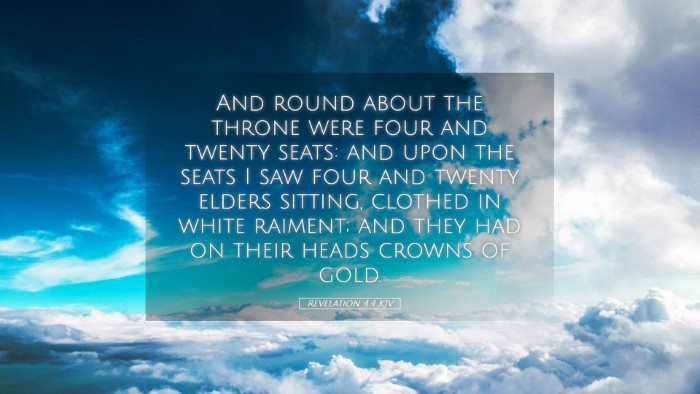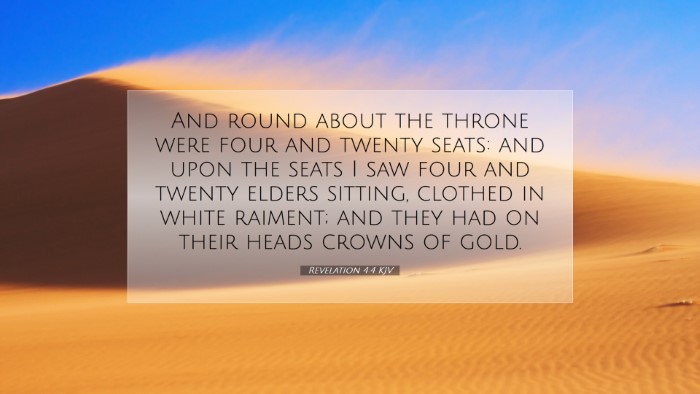Commentary on Revelation 4:4
Revelation 4:4 reads: "And round about the throne were four and twenty seats: and upon the seats I saw four and twenty elders sitting, clothed in white raiment; and they had on their heads crowns of gold."
Contextual Background
The Book of Revelation, penned by John during his exile on Patmos, unveils the divine realities and eschatological truths concerning the end times. Chapter 4 serves as a pivotal transition from the letters to the churches into a vision of heavenly worship and the majesty of God. This verse portrays the heavenly court and sets the stage for the unfolding of God’s plan.
Analysis of Key Elements
1. The Throne
The throne represents the divine authority and sovereignty of God. Matthew Henry notes that the throne is a symbol of God's kingdom, asserting His rule over all creation. The centrality of the throne in John’s vision signifies that all aspects of heaven and earth are ultimately subject to divine governance.
2. The Twenty-Four Elders
The twenty-four elders seated around the throne symbolize a representative assembly. Albert Barnes suggests that these elders may represent the twelve tribes of Israel and the twelve apostles, encapsulating both the Old and New Covenants. This interpretation indicates the inclusivity of God’s people—Jew and Gentile—within His eternal kingdom.
Adam Clarke goes a step further by highlighting the significance of their roles. The elders are depicted as having both authority and honor, indicated by their crowns, which signifies their victory and reward for faithfulness.
3. White Raiment
Their white raiment signifies purity and righteousness. Matthew Henry emphasizes that the garments illustrate the sanctification of believers, suggesting that the elders have been made clean through the blood of the Lamb, thus reflecting the nature of their transformed status in Christ.
This imagery resonates with the overarching theme in Revelation where purity signifies eligibility for the eternal kingdom and communion with God.
4. Crowns of Gold
The crowns of gold denote victory and rewards bestowed upon those who have persevered in faith. As interpreted by Albert Barnes, these crowns represent the believers' triumphant acknowledgment of their service and loyalty to God. The gold crowns also symbolize the intrinsic value and eternal nature of the rewards awaiting the faithful.
Adam Clarke emphasizes that these crowns are not merely ornamental but are reflective of the honor that God bestows upon His faithful servants. They represent a share in Christ’s victory and an invitation to reign with Him.
Theological Implications
Revelation 4:4 offers profound theological insights. It reflects the nature of divine worship, the accessibility of believers' representation before God, and the assurance of eternal life. The scene described further emphasizes God’s sovereignty, the call for holiness among His people, and the assurance of reward for perseverance.
The presence of the elders also points to the continuity and unity of God’s plan throughout scripture, which culminates in the final redemption of the redeemed. Their roles highlight the importance of community in worshiping God and acknowledging His authority.
Application for Believers
For pastors, students, and scholars, Revelation 4:4 serves as a call to recognize the heavenly reality that informs our earthly worship. It reminds us of the dignity afforded to believers and the significance of living a life that is reflective of the white raiment we wear—a life that is holy and pleasing to God.
Furthermore, this verse challenges believers to embrace their identity as participants in God’s kingdom, wearing crowns not of human achievement but of divine grace. As they navigate their faith journeys, they are encouraged to focus on the ultimate victory that awaits them in heaven.
Conclusion
In summary, Revelation 4:4 encapsulates profound truths about God’s kingdom, the nature of worship, and the identity of believers in Christ. Drawing insights from Matthew Henry, Albert Barnes, and Adam Clarke, it is evident that this verse not only invites contemplation but also induces a posture of reverence and active participation in God’s majestic plan.


